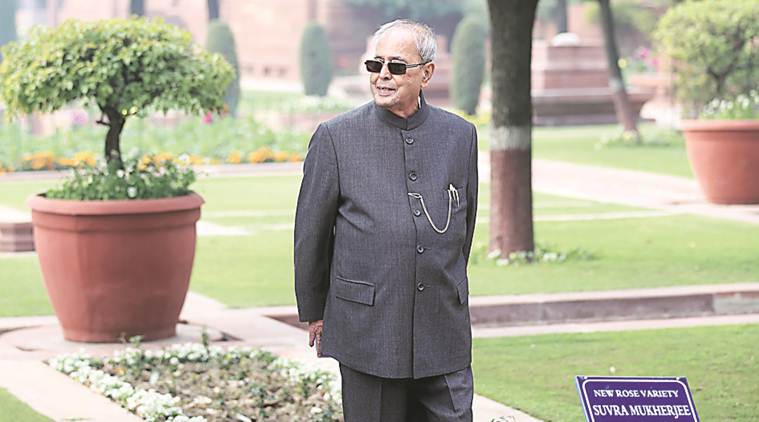Pranab
Mukherjee, President who held up Constitution to government &
Opposition alike
His legacy: speeches on tolerance,
criticism of House disruption, number of mercy petitions disposed.

Before Rashtrapati Bhawan, he used to be the Congress’s key strategist and troubleshooter. If Pranab Mukherjee missed the hurly-burly of active politics in that imposing residence, only the people closest to him would know. But as the President of India – his term is due to end next month – Mukherjee positioned his office as the nation’s conscience keeper, holding the Constitution up to the government, the Opposition and others.
From preaching tolerance at the height of the intolerance debate to criticising persistent disruptions in Parliament, from overturning home ministry recommendations on mercy petitions by citing Supreme Court judgments to putting his foot down on ordinances becoming a government trend, President Mukherjee has worked strictly by the book – in this case the Constitution – remaining very much his own man at the helm yet staying clear of confrontation with the government, even when the latter meant the ideological opponents of the party he came from.
Conscious that the 2014 Lok Sabha elections were going to herald change, he had consulted legal experts before the results to prepare himself for a hung Parliament. The election verdict made those consultations unnecessary.
He brought the experience of his decades in government into the country’s highest office. It was a former external affairs minister who made it clear to the government that a state visit to Israel had to be clubbed with one to Palestine in keeping with India’s foreign policy for decades. And while maintaining his busy schedule, he also brought in his habit of odd working hours into the country’s top office. Mukherjee was known to be a prolific burner of the midnight oil as a minister, and this made Rashtrapati Bhawan staff work too late into the night.
While the proportion of mercy petitions he rejected may well be among the highest by a President — 30 till date — last January he sidestepped the home ministry’s advice on four petitions, rejected by new presidential candidate Ram Nath Kovind who, in his capacity as Bihar governor, acted on the state government’s advice. These petitions were by the accused in the 1992 Bara caste massacre. He went by the Supreme Court’s view that “unreasonable, unexplained and exorbitant” delay in disposal of the mercy petition is ground for its commuting. On the same ground, he also commuted the death sentence Jitu Nain Singh Gehlot in September 2016. The delay in disposing the mercy petition in that case was of more than 14 years.
In January 2015 when the government tried, soon after a nearly washed out winter session, to push through an ordinance amending the Right to Fair Compensation and Transparency in the Land Acquisition, Rehabilitation and Resettlement Act 2013, it took three ministers to convince Mukherjee of the urgency to promulgate it.
Last December, when the Enemy Property (Amendment and Validation) Fifth Ordinance 2016 was sent to him for assent, Mukherjee complied but only after he had written a terse note to the effect that he is clearing it only because it is a matter of importance for the country but it is not in the order of things that an ordinance should be repeatedly promulgated and it should not be treated as a precedent.
After the Opposition met him to flag the way legislation was being passed in the Parliament din, not only did Mukherjee seek legal advice on the President’s role in such a situation but his secretariat also wrote to the Lok Sabha secretariat asking how the Taxation Laws (Second Amendment) Bill 2016 was passed in the winter session amid Opposition protests.
A key part of Mukherjee’s legacy will be the opening up of the formidable fortress that Rashtrapati Bhawan used to be to the common people through multiple programmes and initiatives.
At the height of the intolerance debate when several awards were being returned, Mukherjee, speaking at the National Press Day Function in November 2015 said awards should be cherished. “Sensitive minds who get disturbed… should express their disagreement through debate and discussion.” And, while delivering the sixth K S Rajamony memorial lecture in March this year, he said: “There should be no room in India for the intolerant Indian. India has been since ancient times a bastion of free thought, speech and expression. Our society has always been characterised by the open contestation of diverse schools of thought and debate as well as discussion. Freedom of speech and expression is one of the most important fundamental rights guaranteed by our Constitution. There must be space for legitimate criticism and dissent.”
As the role of J P Rajkhowa as Arunachal governor came under scrutiny, Mukherjee urged governors to maintain the sanctity of the Constitution. Delivering the second Ramnath Goenka Memorial Lecture last month, Mukherjee said the need to ask questions of those in power is fundamental for “preservation” of the nation, especially at a time when those who make the loudest noise drown out those who disagree, In 2016, as the Rajya Sabha logjam entered its third week – that is what necessitated the land acquisition ordinance mentioned earlier – the presidential spotlight turned to the Opposition. “For demonstration, you can choose any other place. But for God’s sake, do your job. You are meant to transact business,” he reminded protesting MPs.







 →
→












0 comments:
Post a Comment